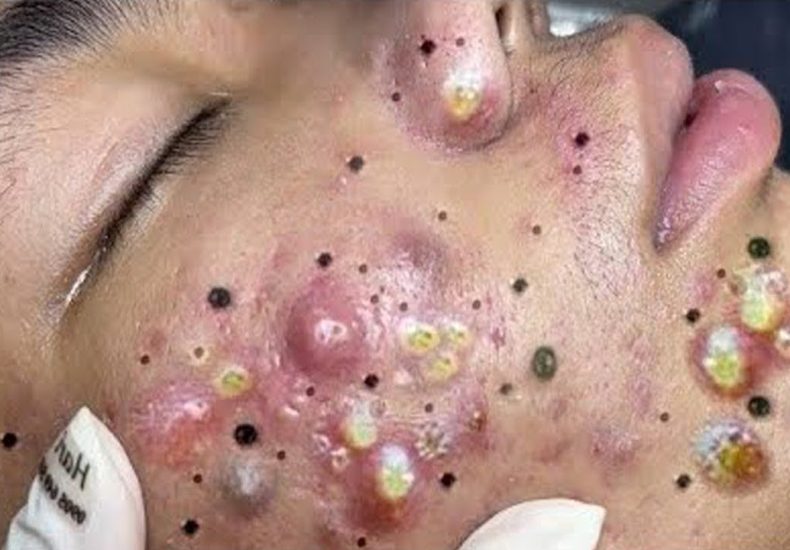
blackheads removing and extraction acne treatment
blackheads removing and extraction acne treatment
Please scroll down to watch the video.👇👇
When it comes to treating blackheads and acne, it’s important to approach them carefully to avoid skin damage or worsening inflammation. Here are some common methods for blackhead removal and acne treatment:
Blackhead Removal:
-
Cleansing:
-
Use a gentle, non-comedogenic cleanser twice daily.
-
Avoid harsh scrubbing that can irritate the skin.
-
-
Exfoliation:
-
Use chemical exfoliants like salicylic acid (BHA) 2–3 times a week. It penetrates pores to dissolve dead skin cells and sebum.
-
Avoid physical scrubs, which can cause micro-tears.
-
-
Pore Strips:
-
Temporary solution; they pull blackheads out but don’t prevent them from forming again.
-
-
Extraction Tools:
-
Only use if you know how to use them properly; otherwise, it’s safer to consult a dermatologist or esthetician.
-
Sterilize tools before and after use to prevent infection.
-
-
Retinoids:
-
Topical retinoids can help increase cell turnover, reducing clogged pores.
-
Acne Treatment:
-
Topical Treatments:
-
Benzoyl Peroxide: Kills acne-causing bacteria and helps reduce inflammation.
-
Salicylic Acid: Helps prevent clogged pores.
-
Retinoids: Helps with cell turnover and prevents clogged pores.
-
-
Hydration:
-
Use oil-free, non-comedogenic moisturizers to maintain skin barrier health.
-
-
Avoid Picking or Squeezing:
-
Picking can worsen inflammation and lead to scarring.
-
-
Professional Treatments:
-
Chemical Peels: Help exfoliate and renew the skin.
-
Facials: Professional extractions performed by licensed estheticians.
-
Laser Therapy: Reduces acne bacteria and inflammation.
-
Prescription Medications: Dermatologists can prescribe stronger topical/oral medications (like antibiotics, isotretinoin).
-
Things to Avoid:
-
Over-washing your face (can strip natural oils and worsen acne).
-
Using too many active ingredients at once, which can cause irritation.
If you’re uncertain or dealing with persistent acne, it’s best to consult with a dermatologist. They can provide tailored advice and treatments.

Removing blackheads and treating acne typically involves a combination of good skincare practices and, in some cases, professional treatments. Here’s a breakdown of approaches you can consider:
Blackhead Removal
-
Cleansing:
-
Use a gentle cleanser twice a day to remove dirt, oil, and dead skin cells.
-
Avoid harsh or abrasive scrubs that can irritate the skin.
-
-
Exfoliation:
-
Chemical exfoliants with ingredients like salicylic acid (BHA) help dissolve excess oil and unclog pores.
-
Use exfoliants 2–3 times a week depending on your skin’s tolerance.
-
-
Topical Treatments:
-
Products containing retinoids (e.g., adapalene) can promote cell turnover and prevent clogged pores.
-
Clay masks may help absorb excess oil and reduce blackheads.
-
-
Extraction:
-
Manual extraction using clean tools or by a dermatologist/esthetician is safer than squeezing with your fingers.
-
Avoid forceful squeezing, which can lead to scarring or infection.
-
-
Pore Strips (Occasionally):
-
These can temporarily remove debris from the surface, but should be used sparingly to avoid irritation.
-
Acne Treatment
-
Topical Treatments:
-
Benzoyl peroxide to reduce bacteria and inflammation.
-
Salicylic acid to help clear clogged pores.
-
Retinoids to regulate skin cell turnover.
-
-
Moisturizing:
-
Use non-comedogenic moisturizers to maintain the skin barrier without clogging pores.
-
-
Sun Protection:
-
Sunscreen (oil-free and non-comedogenic) helps prevent hyperpigmentation and protects the skin during acne treatment.
-
-
Lifestyle Factors:
-
Maintain a balanced diet and manage stress.
-
Avoid excessive touching of the face and keep hair/products away from acne-prone areas.
-
Professional Treatments
-
Chemical Peels: Help exfoliate and clear blackheads/acne.
-
Extraction by Dermatologists: Safer and more precise removal of stubborn blackheads or whiteheads.
-
Prescription Medications: Stronger retinoids, antibiotics, or hormonal treatments for more severe acne.
Things to Avoid:
-
Over-washing or using harsh products, which can irritate skin.
-
Picking or popping pimples, which increases the risk of scarring.
If over-the-counter treatments aren’t helping or you experience severe acne, consulting a dermatologist is recommended.
Leave a Reply